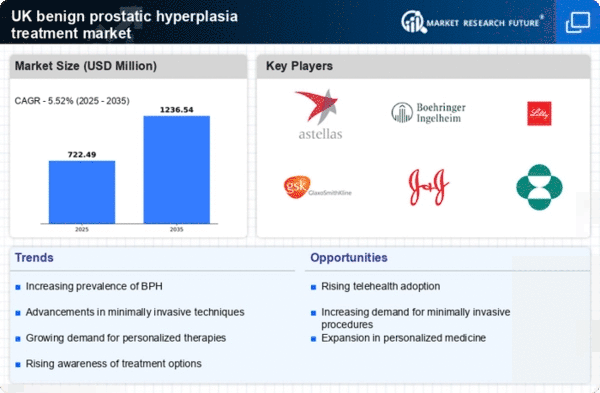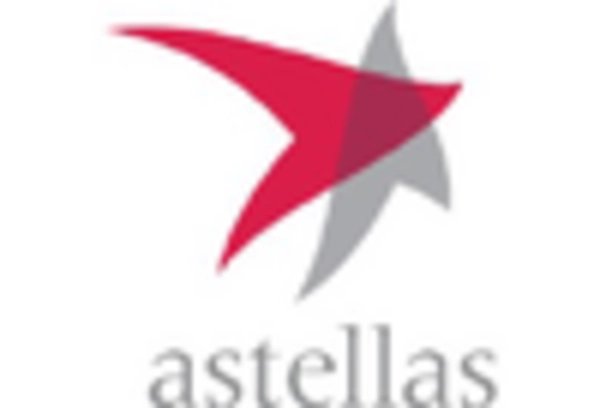Rising Healthcare Expenditure
The benign prostatic-hyperplasia-treatment market is positively impacted by the rising healthcare expenditure in the UK. Increased funding for healthcare services allows for better access to treatment options and improved patient care. The UK government has committed to enhancing healthcare infrastructure, which includes funding for urology departments and BPH treatment programs. As healthcare budgets expand, more resources are allocated to research and development of new therapies, which could lead to innovative treatment solutions. Additionally, higher healthcare spending may facilitate greater patient access to medications and surgical interventions, thereby driving growth in the benign prostatic-hyperplasia-treatment market. This trend suggests a promising outlook for the market as investment in healthcare continues to rise.
Growing Awareness of BPH Symptoms
Awareness of benign prostatic hyperplasia symptoms is gradually increasing among the male population in the UK. Educational campaigns and outreach programs by healthcare organizations are helping to inform men about the condition and its potential impact on quality of life. As awareness grows, more individuals are likely to seek medical advice and treatment for their symptoms, which could lead to an uptick in demand for therapies. This trend is particularly relevant as many men may previously have been reluctant to discuss urinary issues. The benign prostatic-hyperplasia-treatment market stands to benefit from this increased awareness, as more patients become proactive in managing their health and seeking appropriate interventions.
Regulatory Support for New Treatments
Regulatory support for the approval of new treatments is a key driver for the benign prostatic-hyperplasia-treatment market. The UK regulatory framework encourages innovation and expedites the approval process for novel therapies, which can lead to a quicker introduction of effective treatment options. This supportive environment fosters research and development, allowing pharmaceutical companies to bring new medications and technologies to market more efficiently. As a result, patients gain access to a broader range of treatment options, enhancing their ability to manage BPH effectively. The benign prostatic-hyperplasia-treatment market is likely to experience growth as regulatory bodies continue to prioritize patient access to innovative therapies.
Advancements in Treatment Technologies
Technological advancements play a crucial role in shaping the benign prostatic-hyperplasia-treatment market. Innovations in minimally invasive surgical techniques, such as laser therapy and transurethral resection of the prostate (TURP), have improved patient outcomes and reduced recovery times. These advancements not only enhance the efficacy of treatments but also attract more patients seeking less invasive options. The market is witnessing a shift towards these modern techniques, with a reported increase in procedures performed annually. For instance, the number of TURP procedures in the UK has seen a steady rise, indicating a growing acceptance of advanced treatment modalities. As technology continues to evolve, the benign prostatic-hyperplasia-treatment market is expected to benefit from enhanced treatment options and improved patient satisfaction.
Aging Population and Increased Incidence
The benign prostatic-hyperplasia-treatment market is significantly influenced by the aging population in the UK. As men age, the likelihood of developing benign prostatic hyperplasia (BPH) increases, with studies indicating that approximately 50% of men aged 50 and older experience some degree of BPH. This demographic shift is expected to drive demand for treatment options, as healthcare providers seek to address the growing prevalence of this condition. Furthermore, the UK population is projected to continue aging, with the number of individuals aged 65 and older expected to rise by 20% by 2030. Consequently, the benign prostatic-hyperplasia-treatment market is likely to expand, as more patients seek effective management solutions for their symptoms.
















